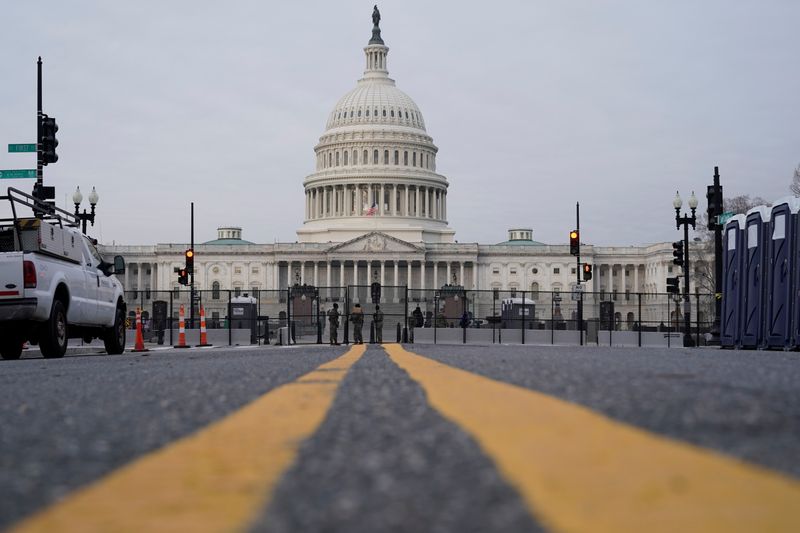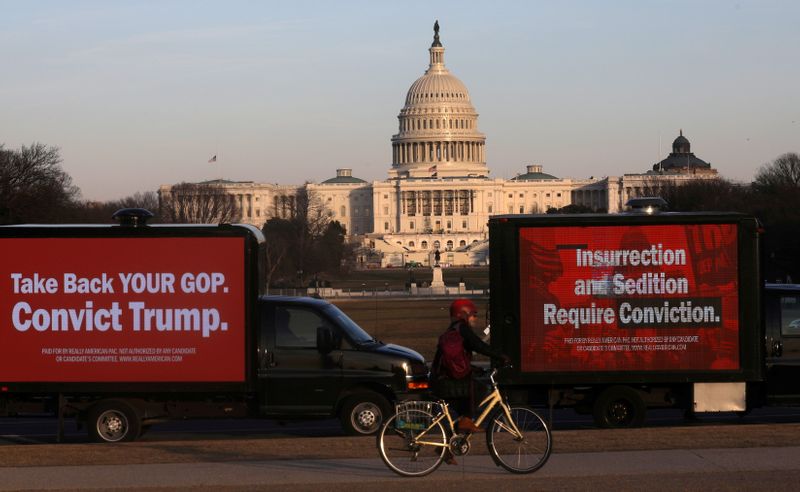By David Morgan and Richard Cowan
WASHINGTON (Reuters) - Donald Trump's historic post-presidency impeachment trial began in the Senate on Tuesday, with Democrats who are hoping to disqualify him from again holding public office again showing graphic video of last month's deadly storming of the U.S. Capitol that he is charged with inciting.
The dramatic proceedings in the 100-seat Senate focused upon the question of whether holding a trial after Trump has left office, as he did on Jan. 20, violates the U.S. Constitution, which allows for impeachment for "high crimes and misdemeanors."
House of Representatives Democrats serving as prosecutors opened their case by showing video of Trump supporters violently overwhelming police at the Capitol in the Jan. 6 attack after he had encouraged people in a speech to "fight like hell" to overturn his Nov. 3 election defeat.
"If that's not an impeachment offense, then there is no such thing," Democratic congressman Jamie Raskin, who led the prosecution, told the assembled senators - serving as jurors - after showing the video.
The video showed Trump backers throwing down barriers and hitting police officers. It showed the moment that protesters tried to break through the doors of the House chamber as lawmakers sheltered within, including when a police officer shot and killed a protester, U.S. Air Force veteran Ashli Babbitt, as she tried to climb through a broken window.
In another scene, a rioter sifting through the contents of the desk of a lawmaker can he heard saying, "There's got to be something here we can use against the scumbags."
Convicting Trump would require a two-thirds majority, meaning that at least 17 Republicans would need to join the Senate's 48 Democrats and two independents in voting against Trump. That is a tall order.
In the Capitol assault, the mob attacked police, sent lawmakers scrambling for safety and interrupted the formal congressional certification of President Joe Biden's victory after Trump had spent two months challenging the election results. Five people died, including a police officer.
Some 170 police officers were injured.
Trump was impeached by the Democratic-led House on Jan. 13 on a charge of inciting an insurrection. Democrats hope to disqualify Trump from ever again holding public office.
Trump is the only president to go on trial in the Senate after leaving office and the only one to be impeached twice. He appears likely to be acquitted thanks to support from fellow Republicans in the narrowly divided Senate.
'GRAVEST CHARGES'
Senate Majority Leader Chuck Schumer, a Democrat, called the accusation against Trump: "The gravest charges ever brought against a president of the United States in American history."
Before the attack, Trump claimed falsely that widespread voting fraud lost him the election to Biden. Senators watched video of Trump addressing supporters at a rally that preceded the attack, repeating his false claims of election fraud.
"Presidents can't inflame insurrection in their final weeks and then walk away like nothing happened. And yet that is the rule that President Trump asks you to adopt," Democratic congressman Joe Neguse told the senators. "I urge you - we urge you - to decline his request, to vindicate the Constitution, to let us try this case."
Most of the senators at the trial were present in the Capitol on Jan. 6, when many lawmakers said they feared for their own safety.
Senate Minority Leader Mitch McConnell, a Republican, was silent while watching the video montage on Tuesday. He sat still, with his hands clasped loosely in his lap.
Defense lawyers plan to argue that only a sitting president can face an impeachment trial. But a majority of legal experts say it is constitutional to have the trial after an official has left office, said Michigan State University law professor Brian Kalt, a leading impeachment scholar.
Senate Democrats are expected to prevail in a Tuesday vote on the constitutionality of the trial. A Republican effort to block the trial on those grounds was defeated 55-45 last month.
The trial is being held with extraordinary security around the Capitol in the wake of the siege including armed security forces and a perimeter of fencing and razor wire.
TUMULTUOUS FOUR YEARS
The trial could provide clues on the direction of the Republican Party following Trump's tumultuous four-year presidency.
Sharp divisions have emerged between Trump loyalists and those hoping to move the party in a new direction. Meanwhile, Democrats are concerned the trial could impede Biden's ability to swiftly advance an ambitious legislative agenda.
Trump's defense has also argued he was exercising his right to free speech under the Constitution's First Amendment when he addressed supporters at a rally in Washington on the day of the Capitol attack.
On Wednesday, the prosecution and defense are due to turn to the merits of the charge.
They will have 32 hours evenly divided over no more than four days to present their cases. The proceedings could be extended further, with senators having time to question both sides.

One year ago, the then-Republican-controlled Senate acquitted Trump on charges of obstructing Congress and abuse of power related to his pressure on Ukraine to launch an investigation into Biden and his son Hunter in 2019.
(Reporting David Morgan and Richard Cowan; Writing by Alistair Bell; Editing by Scott Malone and Will Dunham)
